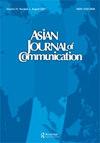The role of social media in empowering activism: testing the integrative model of activism to anti-Asian hate crimes
IF 1.5
2区 文学
Q2 COMMUNICATION
引用次数: 0
Abstract
ABSTRACT This study aimed to predict how individuals engage in activism combatting Asian hate crimes. It is critical to understand how publics engage in anti-Asian hate crime activism because their engagement leads to collective action to solve the issue. This study applies the integrative model of activism to anti-Asian hate crimes. The results showed that situational motivation in problem solving, social media efficacy, and affective injustice were positively associated with social media activism. In addition, this study examined the mediating role of social media activism. The results revealed that social media activism partially mediated situational motivation in problem solving and offline activism. Most notably, social media activism fully mediated between affective injustice and offline activism on anti-Asian hate crimes. Therefore, the integrative model of activism presents a valuable perspective for understanding how individuals participate in activism against Asian hate crimes and the role of social media in facilitating offline activism.社交媒体在赋予行动主义权力中的作用:测试反亚裔仇恨犯罪的行动主义综合模式
本文章由计算机程序翻译,如有差异,请以英文原文为准。
求助全文
约1分钟内获得全文
求助全文
来源期刊

Asian Journal of Communication
COMMUNICATION-
CiteScore
3.70
自引率
0.00%
发文量
38
期刊介绍:
Launched in 1990, Asian Journal of Communication (AJC) is a refereed international publication that provides a venue for high-quality communication scholarship with an Asian focus and perspectives from the region. We aim to highlight research on the systems and processes of communication in the Asia-Pacific region and among Asian communities around the world to a wide international audience. It publishes articles that report empirical studies, develop communication theory, and enhance research methodology. AJC is accepted by and listed in the Social Science Citation Index (SSCI) published by Clarivate Analytics. The journal is housed editorially at the Wee Kim Wee School of Communication and Information at Nanyang Technological University in Singapore, jointly with the Asian Media Information and Communication Centre (AMIC).
 求助内容:
求助内容: 应助结果提醒方式:
应助结果提醒方式:


